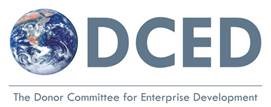Have you ever wondered, how the business environment can have a positive impact on promoting inclusive business, or what can be done to improve the framework conditions for local economic development? Did you ask yourself whether womens' economic empowerment is being limited by regulations and legislation and how such limitations can be overcome? Are you interested to know which.......
.....are decisive policy reforms which can promote the productivity of the workforce with the respective effects on their employment and income? Were you aware of the fact that the actions to improve the business environment in sectors like pharmaceuticals or horticulture require tough political choices and are not at all value-neutral?
If yes, the work of the Business Environment Working Group (BEWG) of the Donor Committee for Enterprise Development (DCED) might be of interest to you.

On June 14th 2016 , we participated in the Annual Meeting of the DCED that took place in Härnösand, Sweden. In 2002 the BEWG was founded to serve as a multi-donor platform for sharing knowledge, experience, and best practices in supporting business environment reforms. The June meeting was the occasion to discuss the advancement of work in several areas the BEWG works on. The way the BEWG functions, it defines topics related to the Business Environment which are of joint donor's interest and subsequently commissions desk reviews and interviews, based on which technical reports are generated, which finally can be selected to become Annexes to the Donor Guidance approved in 2008.
To summarize, the
business environment is defined by the DCED as a complex of policy, legal, institutional, and regulatory conditions that govern business activities. It is a sub-set of the broader investment climate. Specifically, the business environment is comprised of
three elements:
·
Policy and legal framework – The policies, laws and regulations that affect business;
·
Regulatory and administrative framework –The ways in which policies, laws and regulations are enforced and managed); and
· Institutional arrangements – The ways in which government and business represent themselves and communicate with each other e.g. through government agencies, regulatory authorities, and business membership organisations including businesswomen associations, civil society organisations, trade unions, etc.
The
progress of the work on the following topics was discussed during the meeting:
·
Business Environments for Inclusive Business: with the objective of examining how donor and development agencies can support the growth of inclusive businesses through BER, the working group has commissioned an expansive study into this topic and the experiences of agencies. At the very least, for the coming financial year, it is envisaged that a short synthesis paper will be prepared.
·
Sector-Specific BER: a detailed study of agency approaches to supporting vertical or sector-specific BER was undertaken, focusing on the Horticulture, Renewable Energy, Pharmaceuticals, and Mining sectors. The technical report was finalized in the first quarter of 2016 and an Annex to the 2008 Donor Guidance has been produced and was successfully submitted for adoption by the BEWG at its meeting in Sweden in June 2016.
·
BER for Green Growth: The BEWG cooperated with the Green Growth Working Group to undertake further work on the role of BER in promoting green growth. This has resulted in a detailed technical report, as well as case studies. A mentor group, comprising members of the GGWG and BEWG has been formed to advise this work.
·
Beyond National BER: A technical report on subnational (local) and regional BER has been prepared and presented. While more work may be required to better understand the principles, methods and lessons learned in supporting subnational and regional BER, at the very least it is envisaged that a short synthesis paper will be prepared, most likely in the form of an Annex to the Donor Guidance.
·
Gender and BER: the WEEWG commissioned a consultant to examine the issues surrounding BER and gender. This has resulted in a technical report. The study sought to identify the BE issues that have a direct and specific effect on women-owned-and-managed enterprises and employment of women and to formulate a collection of good practices and lessons learnt. The study comprises a literature review and stocktaking of donor programming including interviews.
|
What's in it for SDC?
For SDC the Business Environment is not a main area of engagement. Nevertheless it impacts SDC's work on Employment and Income. In our MSD programs, some of the identified constraint factors relate to deficiencies in the Business Environment and are often addressed by our programs adopting a
sector-specific lens. In Local Economic Development, the
sub-national business environment often plays an important facilitating or restricting role in the initiatives our programs pursue. Considering the mandate to promote social
inclusion, to consider
gender discrimination and empowerment as well as to consider the
environmental effects also of our E&I programs, the various technical reports and donor guidance annexes do provide concrete ideas and recommendations on how SDC can and should engage. The upcoming work on BER and Labour productivity finally should provide some guidance on policy-related reforms for our engagement on
Vocational and Professional Education and Training, which constitute an important contribution to promoting Youth Employment. It is therefore quite obvious that a large part of the work done by the BEWG is of relevance for SDC's work and deserves the attention of SDC staff and its implementing partners.
At the same time, in view of the upcoming work of the DCED, we are called to contribute to the work of the BEWG with our knowledge, experiences and lessons learned. With regards to the work on sub-national BER we have already done so and as a consequence the related study recognizes the importance of working systemically on the improvement of sub-national BER, e.g. by involving all relevant local stakeholders in the definition of such reforms. This will apply as well for the upcoming work on gender and labour productivity. |
|
It also comprises lessons learned and suggests future areas of work and interest as well as gender-sensitive sample indicators and an annex to the Practical Guidance. The study involves more than 20 interviews. Further activities in this process are to commission a series of case studies to deepen the understanding on the following issues:
o Research on examples of public procurement policies and initiatives in the private sector to encourage procurement from women-owned or managed enterprises;
o Differential implications of tax policy on women-owned or managed enterprises as opposed to male-led or owned enterprises; and
o Informality
In addition,
new working items have been decided for the upcoming future:
· BER and Labour Productivity: An important issue for many donor and development agencies is how business environment reform can be used to promote skills development and labour productivity. Key questions to answer are:
o What is the importance of the availability of a highly qualified and productive workforce for enterprise development?
o What do donors do in this regard, what are the experiences, what the constraints, what the success factors?

·
Public Procurement for SMEs: Many countries have procurement regulations and rules that provide preferential treatment for SMEs in public procurement (e.g. a certain % of the annual budget is set aside for SME adverse impacts procurement). However, there is very little information on the impact such policies and regulations have had on the development and growth of companies that have benefited from such preferential treatment, as well as any this may have had (the risk with preferential treatment is that it can be manipulated for capture and rent seeking which ultimately increases prices and has a negative impact on transparency and competition).
While the final annexes and technical reports can be downloaded on the
BEWG website, colleagues interested in getting an insight in draft reports or in contributing to the upcoming work are kindly invited to contact
Alexander.Widmer@eda.admin.ch
.
